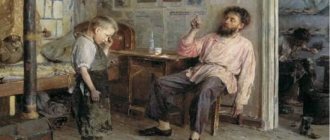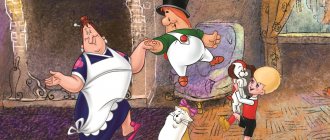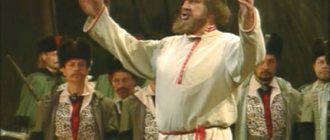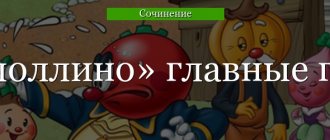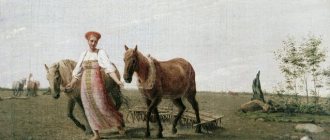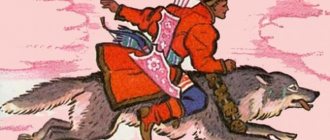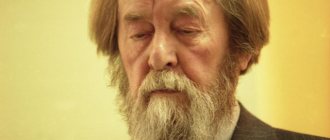Bogomolov "Ivan" in abbreviation
Vladimir Bogomolov “Ivan” summary for the reader’s diary:
The story begins with the army finding a boy off the banks of the Dnieper. The story takes place during the Great Patriotic War. It turns out that Ivan is a young intelligence officer. He even swam across the river to complete the task.
Lieutenant Galtsev at first could not believe it and received the boy unflatteringly. But he soon regretted it and changed his mind. He was treated differently, but was often valued for his bravery. Soon Kholin arrived and presented Ivan with a uniform and awards for excellent service. They leave together.
As it turned out, Ivan’s family died in the war, so he decided to take revenge on his enemies by helping the Red Army. The author also draws pictures of the boy's games. He still remained a child, war is not his business. Ivan collected information on the Nazis. In the end, the young soldier was arrested and shot by the Germans.
Conclusion:
War and children should not intersect in reality. They should be busy with games, education, and not scary things. Horrors crippled the souls of innocent people. At the same time, courage and exploits will be valued throughout eternity.
The story encourages us to thank veterans for their resilience and freedom. Bogomolov admires the love for the homeland of the children of war. They are capable of a lot and their contribution to the victory is very large.
Arrival of Captain Kholin
Upon returning, Galtsev saw that Bondarev was no longer sleeping. Soon the captain arrived. He rushed to the boy, and only now the lieutenant learned the name of his guest. Ivan immediately perked up and smiled for the first time. Kholin said that Katasonych was waiting for him. To this the boy replied: there were Germans there, so there was no way to get to Dikovka. He also added that he was swimming on a log and almost drowned. This is how the image of the main character Bogomolov gradually reveals. Ivan (the summary, unfortunately, can only tell superficially about the hero) still seemed small and weak to the lieutenant.
Kholin ordered to remove people from the dugout and secretly drive the car. Ten minutes later, the boy, dressed in a tunic and trousers, with a medal and order on his chest, was unrecognizable. They started talking at the table, and the lieutenant found out that Bondarev was sent to Suvorov, but he refused: it was not the time. And when Kholin poured vodka, the boy made a toast: “... may I always come back” - and took a sip from the mug. Soon Ivan stood up and demanded: “Let's go!” Kholin was confused, but did not contradict.
Before leaving, Galtsev shook the boy’s hand and said: “... Vanyusha, goodbye!” However, Bondarev corrected: “Not goodbye, but goodbye!” - and looked from under his brows. This scene makes it clear that the heroes are destined to meet. And it gets even more mysterious.
Short retelling of “Ivan”
Summary of “Ivan” Bogomolov:
Young senior lieutenant Galtsev, acting battalion commander, was woken up in the middle of the night. A boy of about twelve years old was detained near the shore, all wet and shivering from the cold. To Galtsev’s strict questions, the boy only answers that his last name is Bondarev, and demands to immediately report his arrival to headquarters.
But Galtsev, not immediately believing it, reports about the boy only when he correctly names the names of the staff officers. Lieutenant Colonel Gryaznov really confirms: “This is our guy,” he needs to “create all the conditions” and “be more delicate.”
As ordered, Galtsev gives the boy paper and ink. He pours it onto the table and concentrates on counting the grains and pine needles. The received data is urgently sent to headquarters. Galtsev feels guilty for shouting at the boy, now he is ready to look after him.
Kholin arrives, a tall, handsome man and a joker of about twenty-seven. Ivan (that’s the boy’s name) tells a friend about how he couldn’t approach the boat that was waiting for him because of the Germans, and how he had difficulty crossing the cold Dnieper on a log. On the uniform brought to Ivan Kholin, there is the Order of the Patriotic War and the medal “For Courage”. After a joint meal, Kholin and the boy leave.
After some time, Galtsev meets with Ivan again. First, the quiet and modest foreman Katasonych appears in the battalion. From observation points he “watches the Germans”, spending the whole day at the stereo tube. Then Kholin, together with Galtsev, inspects the area and trenches.
The Germans on the other side of the Dnieper are constantly keeping our bank at gunpoint. Galtsev must “provide every assistance” to Kholin, but he does not want to “run” after him. Galtsev goes about his business, checking the work of the new paramedic, trying not to pay attention to the fact that in front of him is a beautiful young woman.
Ivan, who arrived, is unexpectedly friendly and talkative. Tonight he has to cross to the German rear, but he doesn’t even think about sleeping, but reads magazines and eats candy. The boy is delighted with the Finnish girl Galtsev, but he cannot give Ivan a knife - after all, it is a memory of his deceased best friend.
Finally, Galtsev learns more about the fate of Ivan Buslov (this is the boy’s real name). He is originally from Gomel. His father and sister died during the war. Ivan had to go through a lot: he was in the partisans, and in Trostyanets - in the death camp. Lieutenant Colonel Gryaznov persuaded Ivan to go to the Suvorov Military School, but he only wants to fight and take revenge. Kholin “didn’t even think that a child could hate so much...”.
And when they decided not to send Ivan on the mission, he left on his own. What this boy can do, adult scouts rarely succeed. It was decided that if Ivan’s mother was not found after the war, he would be adopted by Katasonych or the lieutenant colonel.
Kholin says that Katasonych was unexpectedly called to the division. Ivan is childishly offended: why didn’t he come in to say goodbye? In fact, Katasonych had just been killed. Now Galtsev will be third. Of course, this is a violation, but Galtsev, who had previously asked to be taken into intelligence, decides to do so.
Having carefully prepared, Kholin, Ivan and Galtsev go for the operation. Having crossed the river, they hide the boat. Now the boy faces a difficult and very risky task: to walk fifty kilometers behind German lines unnoticed. Just in case, he is dressed like a “homeless brat.” Insuring Ivan, Kholin and Galtsev spend about an hour in ambush and then return.
Galtsev orders for Ivan exactly the same Finnish woman as the one he liked. After some time, having met with Gryaznov, Galtsev, already confirmed as a battalion commander, asks to hand over the knife to the boy.
But it turns out that when they finally decided to send Ivan to school, he left without permission. Gryaznov is reluctant to talk about the boy: the fewer people know about the “out-of-towners,” the longer they live.
But Galtsev cannot forget about the little scout. After being seriously wounded, he ends up in Berlin to seize German archives. In the documents found by the secret field police, Galtsev suddenly discovers a photo with a familiar high-cheekboned face and wide-set eyes.
The report says that in December 1943, after fierce resistance, “Ivan” was detained, observing the movement of German trains in the restricted zone. After interrogations, during which the boy “behaved defiantly,” he was shot.
This is interesting: Bykov wrote the story “Sotnikov” in 1969. In the story, Bykov raises the existential problems of heroism and betrayal, the influence of circumstances on a person. On our website you can read online a summary of Sotnikov chapter by chapter. The author reveals the struggle between good and evil in the souls of the heroes, explores the psychological state of people during the war.
Memory of a friend
The senior lieutenant often remembers Ivan and looks forward to meeting him. He managed to get the same Finnish woman for the boy. After some time, he meets with Lieutenant Colonel Gryaznov, who probably knows something about the fate of the teenager. He asks me to give him a gift. It turned out that after returning from the mission, the command decided to send the guy to school. This did not suit Ivan, and he left the division without permission. Galtsev noticed that the lieutenant colonel was reluctant to talk about him.
Shortly before the end of the war, the senior lieutenant ended up in Berlin. Further events described in the work are as follows:
- Galtsev was approved as battalion commander;
- Kholin died in battle, covering the retreat of the scouts;
- Lieutenant Colonel Gryaznov was transferred to a new duty station.
During one operation, Galtsev’s fighters discovered an archive in a German car. In one of the folders, the lieutenant found the file of the young intelligence officer Ivan.
It turned out that during one of the operations the boy was detained. He was tortured for a long time and then shot. The teenager, like many children, gave his life for the liberation of his homeland.
A summary of Vladimir Bogomolov’s story “Ivan” can be written down in a reader’s diary or used to prepare for a lesson . After reading the retelling, the story must be read in its entirety chapter by chapter. The book will not leave the reader indifferent. It allows you to experience the terrible events of the Great Patriotic War, feel the tragedy and realize the severity of the trials that befell the little fighters.
The plot of the story “Ivan” in chapters
“Ivan” Bogomolov summary with a description of each chapter of the work:
Chapter 1
Senior Lieutenant Galtsev, who was temporarily acting as battalion commander, was woken up in the middle of the night. A boy was detained near the shore and demanded to be taken to the headquarters to see the commander.
Galtsev saw in front of him a thin boy of about eleven years old, “blue from the cold and shivering.” To the lieutenant’s strict questions, he only answered that his last name was Bondarev, and insistently demanded to be informed of his arrival at headquarters. Galtsev refused to do this, and only when the boy named the names of the staff officers did he believe him.
Lieutenant Colonel Gryaznov confirmed: “This is our guy.” The boy took out “grains of wheat and rye, sunflower seeds and pine needles” from his scarf, carefully counted them and wrote down the data on a piece of paper, which he urgently sent to headquarters.
Chapter 2
Ivan could not fall asleep, and all the time he asked Galtsev whether his message had been delivered or not. Soon a “tall, dark-haired handsome man” Kholin appeared, who greeted Ivan like an old friend. The boy told him that because of the Germans he could not get to the boat, and was forced to swim across the Dnieper from another village. It was a great miracle that “on a stormy night, in cold October water,” he was able to cross the river.
Kholin brought clean clothes to Ivan. When the boy changed clothes, Galtsev noticed that the tunic was “with the Order of the Patriotic War, a brand new medal “For Courage”.” Having refreshed themselves, Ivan and Kholin left by car.
Chapter 3
Three days later, Petty Officer Katasonov came to Galtsev and asked to “see the German” from an observation post. He said that by order of the commander, Vanyushka was sent to “school, to Suvorov,” but he refused. The boy, whose soul was corroded by a terrible hatred of the invaders, wanted to fight the entire war as a scout.
Galtsev went on a detour, accompanied by Kholin, who repulsed him with his unceremoniousness. They went into the battalion first-aid post, where a new paramedic arrived - “a stately, about twenty, beautiful blonde with bright blue eyes.” Noticing Galtsev’s interest in the girl, Kholin began to offend him in every possible way.
Chapter 4
Vanya arrived, looking “refreshed and healthier.” He surprised Galtsev with his talkativeness and friendliness. This time, Katasonov and Kholin were supposed to “transport the boy across the Dnieper to the rear of the Germans.” However, Ivan didn’t even think about worrying - he gnawed on candy and looked at magazines. He really liked Galtsev’s knife, but he could not give it to the boy, since it was a memory of a friend.
From Katasonov, Galtsev learned that Vanya’s father, a border guard, died on the very first day of the war. His tiny sister was killed right in the boy’s arms, and he knew nothing about the fate of his mother.
Galtsev wanted to join the scouts, but Kholin refused him. When it became known that Katasonov was urgently summoned by the Division commander, Galtsev took his place. None of them knew yet that Katasonov had been killed.
Chapter 5
After dinner, Kholin laid out the map and brought Galtsev up to date. After careful preparation, they set out to perform the operation.
Chapter 6
Having safely crossed the river, the scouts hid the boat. Vanya, deliberately dressed in old rags, left his senior comrades and disappeared into the darkness.
Chapter 7
Having released the boy, Kholin and Galtsev hid in ambush. Soon the Germans passed dangerously close to them. Galtsev had a “need, a need to kill them immediately,” and only thanks to the cool and restrained Kholin did he not reveal their presence. When the Germans left, the scouts returned to their own.
Kholin said that Ivan “needs to walk more than fifty kilometers,” and at every step he could stumble upon a German patrol. He was very worried about the fate of the boy, who, in case of danger, no one could come to the rescue.
Chapter 8
Galtsev ordered from a local skilled mechanic exactly the same Finnish machine that Vanya liked. At the right opportunity, he wanted to hand over the knife, if not to the boy himself, then at least to Lieutenant Colonel Gryaznov. Soon such an opportunity presented itself to him. He learned from the lieutenant colonel that Ivan returned from the mission alive and unharmed.
Afterwards the boy was sent to study at school, but he left without permission. Galtsev asked to give Vanya the Finn, to which Gryaznov replied that he “has about a dozen of these knives, no less.” The lieutenant colonel did not want to go into details about the little intelligence officer - “the less they talk about them and the fewer people know about them, the longer they live.”
Chapter 9
The severe wound led to Galtsev “becoming ‘limitedly fit’” and sent to Berlin “to seize German archives and documents.” Among the miraculously preserved documents, Galtsev discovered a photo of Vanya. The report said that a schoolboy was detained for “observing the movement of trains” in the restricted area. During arrest, he fiercely resisted, and after interrogation he was shot.
Conclusion
With his work, Vladimir Bogomolov wanted to say that war is a difficult test, especially for children who had to share all the hardships of wartime on an equal basis with adults.
I want to go into art!
He was born in 1961 in Elektrostal, near Moscow. An ordinary working family - the mother worked as a painter, the father worked as a driver. During the holidays, Gena spent a lot of time in the village of Kriulino, located not far from Elektrostal, where his father was from. They say that it was there, in games with friends, that the makings of an artist began to emerge.
Frolov studied at school No. 3 in the city of Elektrostal. Not every educational institution can boast of a whole scattering of famous graduates: two Heroes of the Soviet Union, including one cosmonaut, People's Artist of Russia, a famous polar explorer, several Russian hockey stars, politicians, journalists. There were also several famous actors among the graduates of school No. 3, but Gennady Frolov is still especially singled out at school.
After graduating from school in 1978, Gennady applied to VGIK, to the acting department. And he entered immediately, and into the workshop of the great Sergei Gerasimov and Tamara Makarova.
This was the penultimate acting course for the famous couple. Together with Frolov, there were nine other people in the group, the most famous of whom later became actress Marina Levtova. Unfortunately, she, like Gennady Frolov, passed away tragically and too early.
“At the Beginning of Glorious Deeds”, 1980 Still from the film
Debut in the setting of the Peter the Great era
For the first time, Gennady appeared on screen not in a feature film, but in a documentary. In 1979, a film entitled “VGIK: teachers and students talk about the profession” was released. Frolov is very serious and focused in the frame - the exact opposite of most of his future roles. Gerasimov highly appreciated the student’s attitude towards the profession.
The director took on the task of staging a duology about the young years of Peter I. The cast of the project turned out to be amazing: Oleg Strizhenov, Tamara Makarova, Roman Filippov, Mikhail Nozhkin, Nikolai Eremenko Jr., Vadim Spiridonov ... Gerasimov often invited students whom he taught to play roles in his films. Frolov received the role of Artamon Brovkin in the films “Peter’s Youth” and “At the Beginning of Glorious Deeds”. Far from being the main one, of course, but he played it vividly, being remembered by the audience from his first appearance on the screen.
In 1981, Frolov starred in two films at once - “Born by the Storm” and “Vasily and Vasilisa.” The films are good, and the actor coped with his task, but the public did not really remember them.
His next film was the children's film “Seven Little Soldiers” about a boy who dreamed of tin soldiers, but instead of them his friends turned out to be a whole squad of real soldiers, led by Sergeant Resurrection. Frolov played Private Saturday in this modern fairy tale. It is curious that by the time the film was released, he himself had actually already served in the Soviet Army.
“After the rain, on Thursday...”, 1986 Still from the film
